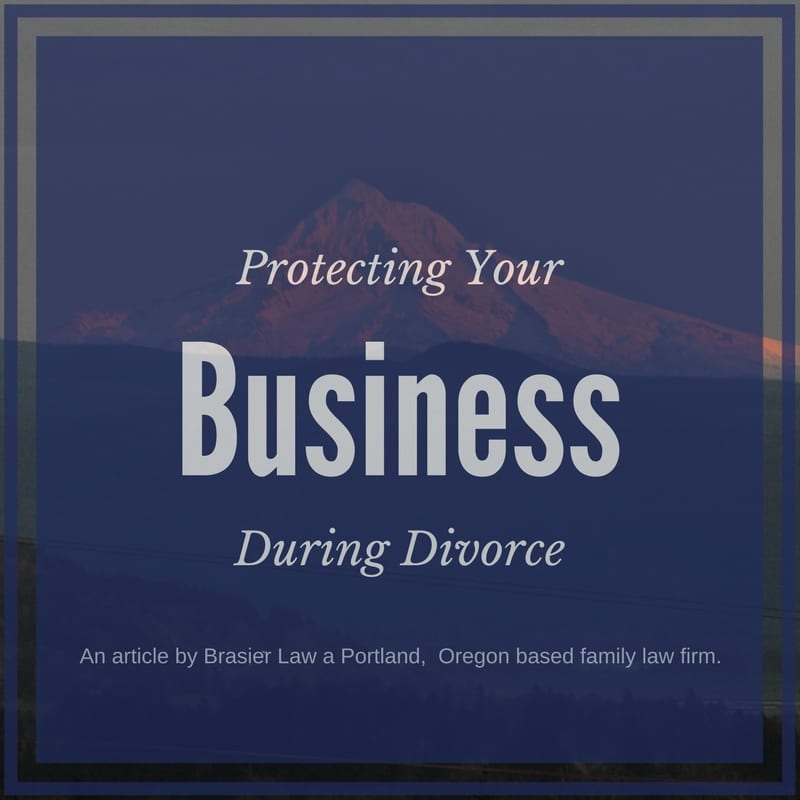
Protecting small a business during divorce can be a tricky prospect especially if there is a high amount of animosity during your divorce. Often, when the parties own a small business, division of that asset can be like walking in a legal minefield. There are a few key considerations, such as how to keep the business afloat, how to divide its value, and how to protect yourself from liability. Some people, when they have run the business themselves with no help from their spouse, also want to try to shield the value from their significant other.
“There are a few key considerations, such as how to keep the business afloat, how to divide its value, and how to protect yourself from liability.”
First, in Oregon, small businesses are assets to be divided just like a car or house. The tricky part can be determining how much said business is worth. When valuing a car, you can find the Kelly Blue Book value. Businesses aren’t so simple. Valuing a small business can be quite complicated, and often requires hiring a business appraiser to come and write an estimate.
Almost all business have value, and there are more theories about how to value a business than you might expect. Some valuations are based on annual profits, some on gross sales, and some on other factors including what industry it is in. Some businesses have no value, as they are so closely tied to the person running it that it is impossible to separate the person from the business. This is more often the case with sole props than corporations or partnerships. It is best to talk to an Oregon divorce lawyer early in the process if you have a small business to discuss how your business would best be valued.
One part of protecting business during divorce is keeping it up and running smoothly. It can be tricky to keep a business operational through a divorce, particularly when both parties equally help to run it. Both parties may have incentive to keep the business going, but may not know how best to do that. It is much easier if the business is clearly run by one spouse. When both parties are necessary to the business though, it may take some creativity and willingness to work together to ensure the business doesn’t go defunct during the animosity of a divorce. Under almost all circumstances though, one person would end up keeping the business while the other gets “bought out” of their value.
“When both parties are necessary to the business though, it may take some creativity and willingness to work together to ensure the business doesn’t go defunct during the animosity of a divorce.”
The next factor to take into account during the process of divorce is the liability (or debt) of the business. Typically, it is easy to protect one spouse from liability. The law builds in clauses that protect a spouse from the other’s obligations after the marriage. If there are debts associated with the business, they will be factored into the value your appraiser proposes. If there are future liabilities or debts of the business, those typically, as long as you put proper language in your court order, will be owed exclusively by the person who keeps the business. Having the proper language is one important reason to find a family law attorney to ensure it is correct.
The hardest question to answer is how to protect a business from your spouse getting value from it in a divorce settlement. Again, Oregon says that businesses are an asset, which means that they have value, and both spouses are entitled to half of that value. Some people may find that unfair, for example when one person has always exclusively run their business while the other does nothing. However, that is the law. There are a few exceptions to this rule, but they are a matter of shades, not a clear cut option to employ.
What I mean is, in some circumstances, if you can demonstrate a clear separation of the business, and can demonstrate a clear intent of the parties to keep the business separate, sometimes you can keep your business from being valued by the court. Other factors can go into this decision though, such as the length of the marriage, and whether the business was owned before marriage. It really is ultimately up to the judge to decide what is fair. So there is a whole spectrum to walk in presenting your case to your judge if you want to ask for your business to be excluded from the valuation of your marital property.

Tom Brasier is an experienced family law attorney at Brasier Law, a Portland, Oregon law firm specializing in divorce, custody, and restraining orders. Tom practices family law in Oregon and Washington. You can reach him for additional questions at his Clackamas or downtown Porltand office by calling 1 (503) 855-4777 or by using the contact form below. The information provided here is not meant to replace a consultation with your family law attorney.
